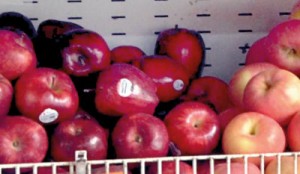News
Agrochemicals: The right use and not abuse
There is much cause for concern about agrochemical residues in vegetables and fruits that Sri Lankans eat.
How many though have taken concrete steps to keep the men, women and children of Sri Lanka informed on the ways and means of minimising the intake of residues of agrochemicals including pesticides, herbicides and weedicides and also fertiliser with their food?
How many have also attempted, through public awareness campaigns, to educate the farming community about the right use and not abuse of agrochemicals?

Shining, ‘good-looking’ fruits: Not good news for the consumer
This crucial issue of preventing agrochemical residues from getting into the food chain and in turn poisoning what the people eat and causing non-communicable diseases (NCDs) has now been undertaken by the Toxicology & National Poisons Information Centre under the direction of Dr. Waruna Gunathilake
It is the crusade that the National Poisons Information Centre based at the National Hospital in Colombo has taken up. It will bring to the fore the need to use the right amount of agrochemicals and fertilisers; the appropriate time to taper off their use; and the link between NCDs and these toxic substances, during the National Poison Prevention Week from November 10 to 16.
Explaining that there is much discussion about ‘good food’, Dr. Gunathilake reiterated and supported the call to strengthen organic farming, bring about stringent quality controls for agrochemicals and fertiliser and strictly regulate their entry into the country.
However, with organic farming taking time to get rooted, he said the immediate need is to stop agrochemicals and fertilisers poisoning the environment.
The eco-balance has been upset by the poisoning of the environment. The root cause of such poisoning has to be addressed without the short-term application of plasters for the results, which would be useless. “The need is to look at the big picture, but we are looking only at fragmentations,” says Dr. Gunathilake, stressing that once the root causes are addressed good, healthy food would be the yield.
Then foods sans pesticide residues and pesticide-contaminated foods leading to a higher incidence of NCDs such as diabetes and also Chronic Kidney Disease of unknown aetiology (CKDu), can be stymied, he said.
Referring to calls for the banning of agrochemicals, he questioned whether it would be practical to do so as it may boomerang on the economy. Banning the use of agrochemicals on small areas of cultivation may not have repercussions but at this juncture, with food issues looming on the horizon, both nationally and globally, is it feasible, he asked.

Dr. Waruna Gunathilake
“Can we feed all the hungry mouths, without large-scale crop production and on vast tracts of land without there being a need to apply agrochemicals? While pursuing the strong option of organic farming, until it becomes sustainable, the solution lies in mitigating the damage already created by the over-use of agrochemicals and fertilisers. This should be done by educating both the farmer and the consumer,” he said.
Agrochemicals are any substances or mixtures of substances which are intended to kill or control insects, rodents, fungi, weeds or other plant or animal life, it is learnt.
Picking the brains of other doctors and scientists, Dr. Gunathilake has found that crop loss is high in Sri Lanka. About 1/3rd of the crops are destroyed by pests during growth, harvesting or storage. Therefore, farmers inevitably resort to large-scale use of pesticides.
Agrochemicals are fat-soluble, according to him and there is growing evidence that as they are bio-accumulative in living things and bio-magnifiers, they can cause lots of NCDs. There is also a need to take a long hard look at pesticide residues in fruit and vegetables.
Quoting a 1989-survey carried out in the districts of Kandy, Matale, Nuwara Eliya and Badulla, Dr. Gunathilake points out that even then it had been found that there was improper use, misuse, carelessness, indiscriminate and inappropriate use of agrochemicals.
He cited the case of tomato cultivations in the Badulla district and said that fungicide-use had been heavy to keep tomatoes looking shiny and fresh then too. Currently, another aspect that needs to be looked into is the transport of vegetables and fruit, as agrochemical-saturated stuff also pollutes the environment while going down the distribution network.
Then there is the matter of proper and specific labelling of agrochemicals, he points out.
The root cause, of course, for most agrochemical troubles is insufficient knowledge on safe and effective use, says Dr. Gunathilake, echoing the concerns of the 1989 survey. “There is an urgent need for evidence-based, methodical and scientific as well as updated credible knowledge.”
Urging that removing poison from the environment is a multi-stakeholder effort, he called on all doctors, scientists, agriculturists, farmers and consumers to come together to ward off this threat.
| Educating the farmers
In the case of farmers, Dr. Gunathilake says that it is vital to educate them on the following: n Maximum residue limits (MRLs) – the acceptable levels of agrochemical residues on crops. MRLs ensure that the total amount of agrochemical residue absorbed through food consumption would not exceed the ‘acceptable daily intake’.Strictly followed in the west, the ‘acceptable daily intake’ or quantity of an agrochemical that a human being is able to ingest in a day without any harmful effects, is important to prevent disease, says Dr. Gunathilake. It is the maximum amount of residues that should be on a crop at harvesting time. This is why it is very important to follow the instructions on the application of agrochemicals, to the letter. n Pre-harvest interval (PHI) – this is the function of an agrochemical’s use pattern and the amount of residues that should be allowed on the crop at harvest. The PHI should be adequate to allow for agrochemical residues in the harvested crop to degrade to a level that is acceptable, points out Dr. Gunathilake. n Restricted entry interval (REI) – this is the period of restriction of access to an area to which agrochemicals have been applied. This should be applicable to farmers and all those who may enter the farming area after such application. Tackling the vital need to enforce PHIs for crops, Dr. Gunathilake says that it can vary depending on the crop and the agrochemical that is being used. There is also a need to identify the pest correctly and apply the right agrochemical, as one type is not for all pests. There should also be caution against over-using agrochemicals.Focusing on what happens in Sri Lanka, he says that even after a crop is harvested, there is spraying of agrochemicals before it is loaded onto trucks for distribution. The last application of anagrochemical should be crop-specific and farmers should be advised about this. This advice should not come from agrochemical dealers. Warning against the ‘anticipatory’ application of agrochemicals as a precautionary move aswell as without assessing the threshold of damage, he says that spraying of dangerous agrochemicals if a single bug is seen is not justified. Proper washing of vegetables and fruit, meanwhile, also helps rid them of agrochemical residues. “Very good-looking vegetables are not good because they are pesticide-tainted. The shine on many a vegetable and fruit is due to this and public demand for good-looking vegetables and fruit may be tempting farmers to over-use agrochemicals,” says Dr. Gunathilake, adding that agrochemicals are a double-edged sword. “They are beneficial if used properly but extremely dangerous if misused.” - Rinse vegetables and fruits thoroughly under running water. |

